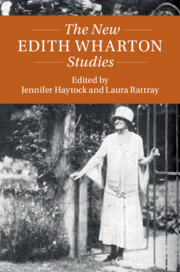Book contents
- The New Edith Wharton Studies
- Twenty-First-Century Critical Revisions
- The New Edith Wharton Studies
- Copyright page
- Contents
- Notes on Contributors
- Acknowledgments
- Editions and Abbreviations
- Introduction
- Part I Self and Composition
- Part II International Wharton
- Chapter 4 Edith Wharton’s Odyssey
- Chapter 5 Edith Wharton’s French Engagement
- Chapter 6 Edith Wharton and Transnationalism
- Part III Wharton on the Margins
- Part IV Sex and Gender Revisited
- Bibliography
- Index
Chapter 5 - Edith Wharton’s French Engagement
from Part II - International Wharton
Published online by Cambridge University Press: 28 November 2019
- The New Edith Wharton Studies
- Twenty-First-Century Critical Revisions
- The New Edith Wharton Studies
- Copyright page
- Contents
- Notes on Contributors
- Acknowledgments
- Editions and Abbreviations
- Introduction
- Part I Self and Composition
- Part II International Wharton
- Chapter 4 Edith Wharton’s Odyssey
- Chapter 5 Edith Wharton’s French Engagement
- Chapter 6 Edith Wharton and Transnationalism
- Part III Wharton on the Margins
- Part IV Sex and Gender Revisited
- Bibliography
- Index
Summary
In this essay, Virginia Ricard argues that Wharton’s view of the place of the individual in society and more particularly the place and role of women was the result of her engagement in French intellectual life. She had read the accounts of French travelers in the United States from Tocqueville to Bourget and had registered their critique of American individualism. This connection did not go unnoticed by French literary critics for whom Wharton‘s novels – and in particular The House of Mirth – became prisms through which to observe American society and the role of women in that society. Yet, as her stance during the Dreyfus Affair shows, Wharton‘s perspective was not simply that of her French predecessors: she developed her own ideas of justice for the individual, of freedom and of progress, while continuing to believe that French society provided the best example of what she called “human communion” precisely because women were essential participants.
Keywords
- Type
- Chapter
- Information
- The New Edith Wharton Studies , pp. 80 - 95Publisher: Cambridge University PressPrint publication year: 2019
- 1
- Cited by

